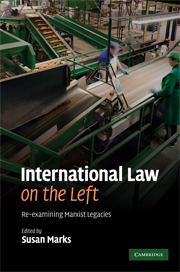Book contents
- Frontmatter
- Contents
- Contributors
- Acknowledgements
- Introduction
- 1 What should international lawyers learn from Karl Marx?
- 2 An outline of a Marxist course on public international law
- 3 The commodity-form theory of international law
- 4 Positivism versus self-determination: the contradictions of Soviet international law
- 5 Marxism and international law: perspectives for the American (twenty-first) century?
- 6 Toward a radical political economy critique of transnational economic law
- 7 Marxian insights for the human rights project
- 8 Marxian embraces (and de-couplings) in Upendra Baxi's human rights scholarship: a case study
- 9 Exploitation as an international legal concept
- Index
3 - The commodity-form theory of international law
Published online by Cambridge University Press: 07 September 2009
- Frontmatter
- Contents
- Contributors
- Acknowledgements
- Introduction
- 1 What should international lawyers learn from Karl Marx?
- 2 An outline of a Marxist course on public international law
- 3 The commodity-form theory of international law
- 4 Positivism versus self-determination: the contradictions of Soviet international law
- 5 Marxism and international law: perspectives for the American (twenty-first) century?
- 6 Toward a radical political economy critique of transnational economic law
- 7 Marxian insights for the human rights project
- 8 Marxian embraces (and de-couplings) in Upendra Baxi's human rights scholarship: a case study
- 9 Exploitation as an international legal concept
- Index
Summary
The necessity of (Marxist) theory
The blight of managerialism
International law has notoriously and accurately been described as a ‘wasteland’ for theory. Of course, the tsunami of managerialist writing is informed by theories of law, international law and the world, but mostly unexamined and the more ideological for that. In this context the rise of what has been called the ‘New Stream’ of radical international law scholarship has been of immeasurable importance, with its project to ‘dislodge the discipline … from its stagnation … and rejuvenate the field as an arena of meaningful intellectual inquiry’.
‘The New Stream … stands as part of a broader movement in contemporary legal theory commonly known as Critical Legal Studies (CLS) or critical jurisprudence.’ The CLS movement is united in its critical attitude to mainstream legal theory and has drawn on eclectic bodies of thought to pursue this. This has led to a problem: despite its powerful critical tools, the New Stream has sometimes been left with a poverty of systematic theory. ‘[I]t is a movement in search of a theory, but at the same time it is a movement which has not agreed that such a theory is either possible or desirable.’
The New Stream and CLS's influences include:
normative philosophy, critical theory, structuralism, anthropology, prepositional logic, literature, sociology, politics and psychiatry … Legal Realism, New Left anarchism, Sartrean existentialism, neo-progressive historiography, liberal sociology, radical social theory and empirical social science
- Type
- Chapter
- Information
- International Law on the LeftRe-examining Marxist Legacies, pp. 92 - 132Publisher: Cambridge University PressPrint publication year: 2008
- 6
- Cited by

